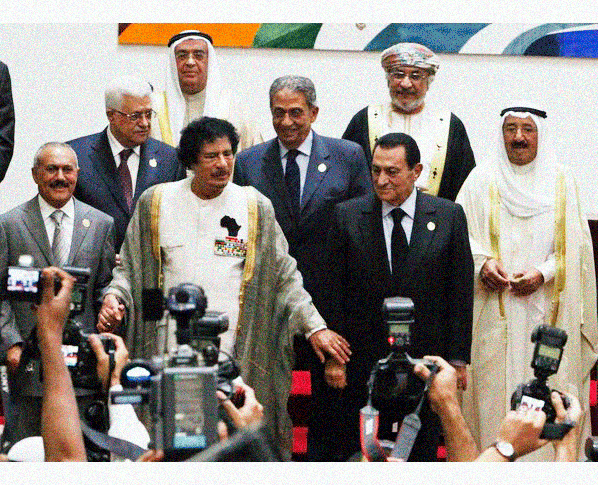 (Pictured: The Arab League leaders, once upon a time.)
(Pictured: The Arab League leaders, once upon a time.)
Two days after Western forces struck Libyan military targets, halting Qaddhafi’s attack on civilians in Benghazi and elsewhere, some observers wonder whether the Arab League will withdraw its support for the intervention.
The League had unanimously endorsed the no-fly zone on March 12th—a “turning point” that compelled America to pursue passage of a U.N. resolution authorizing air strikes. However, the League’s rare commitment to action appeared to be flagging on Sunday when its secretary general, Amr Moussa, averred that the air strikes had gone too far.
Moussa told reporters that “What happened differs from the no-fly zone objectives,” adding, “What we want is civilians’ protection not shelling more civilians.”
His comment about “shelling more civilians” was an allusion to Qaddhafi’s claim that the Western strikes had killed a number of innocents. (That assertion, however, appears to be yet another one of the Libyan leader’s orchestrated shams—see here and here.)
Today, Moussa backpedaled from Sunday’s comments, saying in a press conference with U.N. President Ban Ki-Moon that the League has “no conflict” with the U.N. resolution and supports the rebels.
So what accounts for the Arab League’s apparent waffling?
One reason is Egyptian politics. Moussa, who commands respect in Egypt for standing up to Israel, plans to run for president now that the Mubarak regime has been ousted. He may have been shielding himself against future criticism for his role in green-lighting Western military action in Libya, should things go wrong.
Another reason is that the Arab League faces the same challenge as the kleptocrats and despots who make up its membership: trying to retain relevance in the face of a powerful current of change washing over the Arab world.
League members such as Syria’s Bashar al-Assad, Yemen’s Ali Abdullah Saleh, and Bahrain’s Khalifa bin Salman al Khalifa have responded to protests in their own countries with thuggish violence. They are thus wary of encouraging foreign involvement in another Arab country, as it might set a precedent for their own removal. On the other hand, the last thing Arab rulers want is further instability—including scenes of Qhaddafi-inflicted carnage and chaos.
“People might not like it but the only other option is to allow a civil war to develop in Libya; you’re going to create another Somalia,” Mustafa Alani, a scholar at the Gulf Research Center in the UAE, told the LA Times. “They don’t like military intervention, but in this case it is seen as the lesser evil.”
The Arab rulers are in a “delicate situation,” another expert in the LA Times piece, Mustafa Labbad, noted. “They wouldn’t want to see foreign powers aiding rebels against their regimes. They also don’t want the prospect of another Iraq.”
Stopping Qaddhafi, whose unpredictable antics are now on full display, is therefore seen as the best available option by Arab leaders. At least for now.
M. Junaid Levesque-Alam blogs on Islam and America at his website, Crossing the Crescent.
